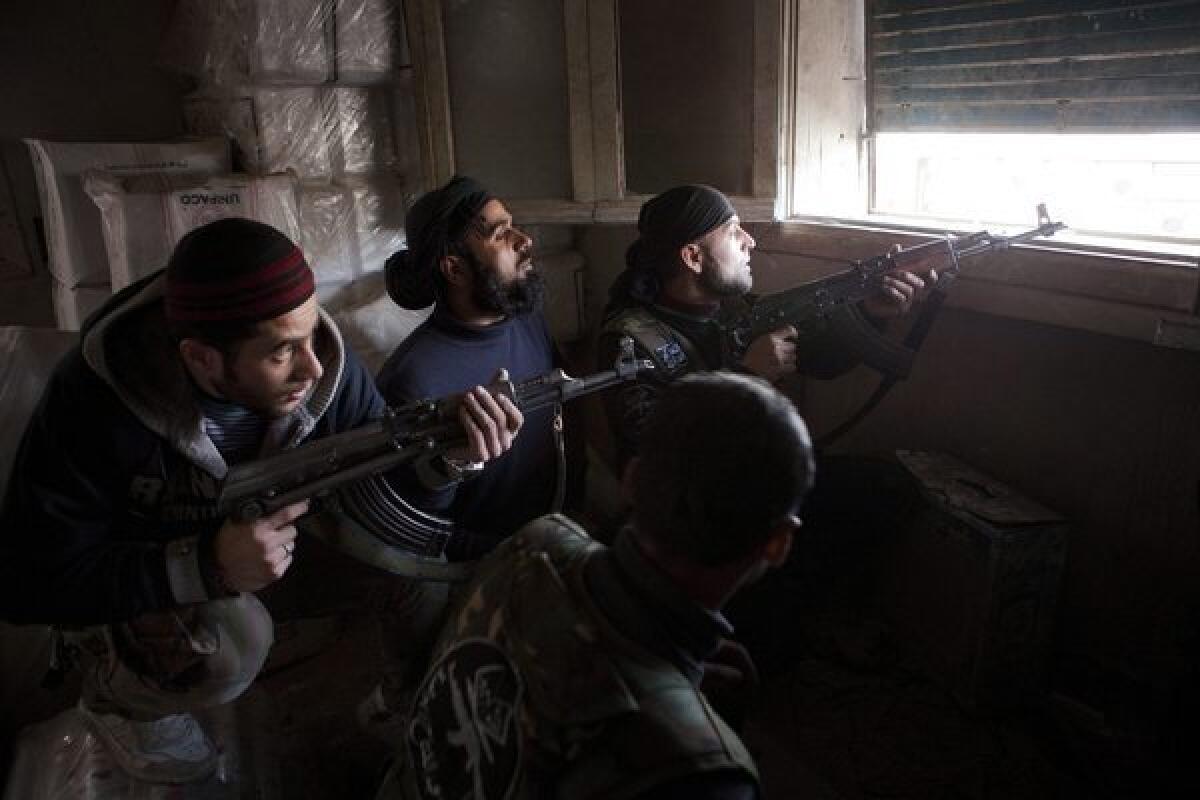Slaying of Syrian rebel commander exposes opposition tension

- Share via
BEIRUT — The shooting death this week of a rebel commander in northern Syria — apparently at the hands of an Al Qaeda-linked militant faction — has exposed tension between the disparate forces fighting to oust President Bashar Assad.
Various versions surfaced Friday about the slaying a day earlier of Kamal Hamami, who appeared to have been killed in a turf dispute with fighters from an insurgent group known as the Islamic State of Iraq and the Sham, an Al Qaeda linked faction.
The Syrian Observatory for Human Rights, a British-based pro-opposition monitoring organization, said Hamami was killed after the Islamic State group tried to dismantle a checkpoint set up by Hamami’s batallion in a rebel-held patch of northern Latakia province. A dispute ensued and shots were fired, resulting in Hamami’s death and injuries to two of his co-combatants, the observatory said.
Hamami, known by his nom de guerre, Abu Bassir al Jeblawi, was affiliated with the Western-backed Free Syrian Army. The FSA is a loose umbrella franchise of various rebel brigades and battalions, with no firm central command. But U.S. officials and their allies view FSA-linked fighters as more moderate than the fundamentalist Islamist rebel factions that embrace Al Qaeda and its philosophy and whose ranks include many foreign volunteers, especially from Arab nations. Still, many FSA-related rebel groups also have an Islamic identity.
There were some reports Friday of the possibility of open conflict in Syria between FSA fighters and Al Qaeda-linked rebel units. But there was no direct confirmation of such hostilities.
One high-ranking rebel official based in the Damascus area said Friday that Hamami’s killing would be investigated.
Government forces have made some significant territorial gains against rebels in recent weeks, seizing several areas formerly under rebel control. Currently, the Syrian military is making a major push to evict rebel fighters from the central city of Homs, long a hot spot in the Syrian conflict.
With government forces bearing down on opposition strongholds, infighting among the rebels would only appear to weaken the insurgent position.
Islamist and FSA brigades have often cooperated in battle. FSA commanders have frequently praised the fighting skills of groups like Al Nusrah Front, which the U.S. government has deemed an Al Qaeda offshoot and a “terrorist” organization. Still, the various rebel groups also sometimes have different goals: The Al Qaeda-linked battalions say they want an Islamist state in Syria, while FSA commanders ostensibly back a democratic transition. The one issue that clearly unifies the fragmented rebel forces is the goal of overthrowing Assad.
U.S. and European officials who support Assad’s ouster say they are considering providing arms to “moderate” rebel groups under the banner of the FSA, while excluding extremists factions. Some observers say that the prospect of a new arms pipeline from the West may have escalated tension between rebel groups in Syria, who are all vying for a limited supply of weapons and other supplies.
There have been several reports in recent weeks of clashes between Al Qaeda-linked rebel groups and other insurgent factions. Some civilians in rebel-held areas of Syria have also protested against what they view as oppressive rule by Islamist rebel occupiers.
Hamami, the slain rebel commander, was reported to have been loyal to the FSA command structure based in neighboring Turkey, under the aegis of the Supreme Military Council and its leader, Gen. Salim Idris, a favorite of U.S. officials and their allies. The council is expected to be the major conduit for any new arms shipments that materialize from the United States and other nations.
Syria’s more than two-year conflict has killed more than 100,000 people, forced hundreds of thousands of Syrians to flee the country, and left broad swaths of the country in nominal rebel control, though often subject to government bombardment. Efforts to reach a negotiated settlement have failed.
[For the Record, 5:30 p.m. PDT, July 12: An earlier version of this post spelled Kamal Hamami’s last name as Hamani.]
ALSO:
Russian activists voice support for Snowden’s asylum bid
Lebanese medical group says being gay is not a disease
Pakistani girl shot by Taliban claims triumph over terrorists
Bulos is a special correspondent
More to Read
Sign up for Essential California
The most important California stories and recommendations in your inbox every morning.
You may occasionally receive promotional content from the Los Angeles Times.









